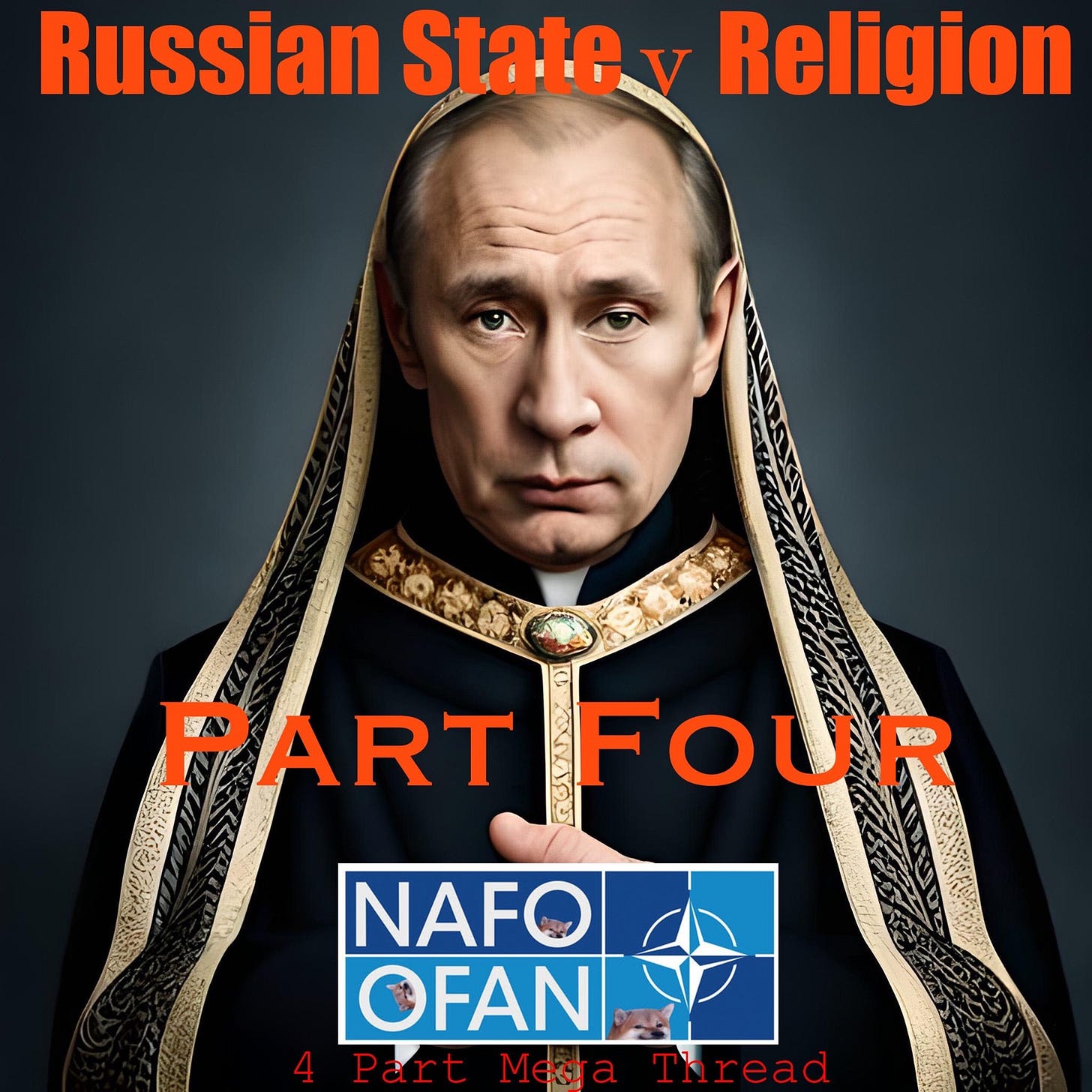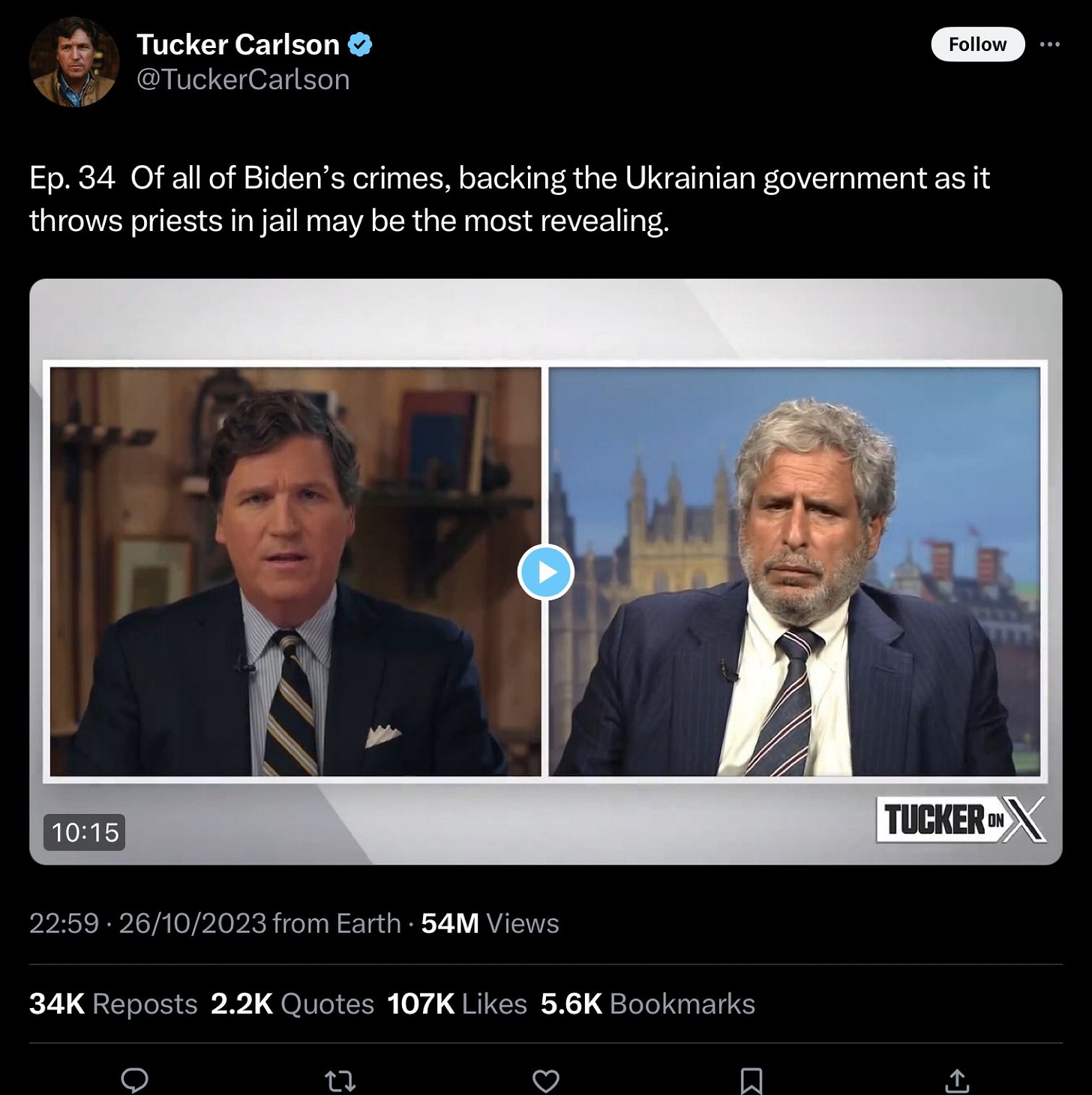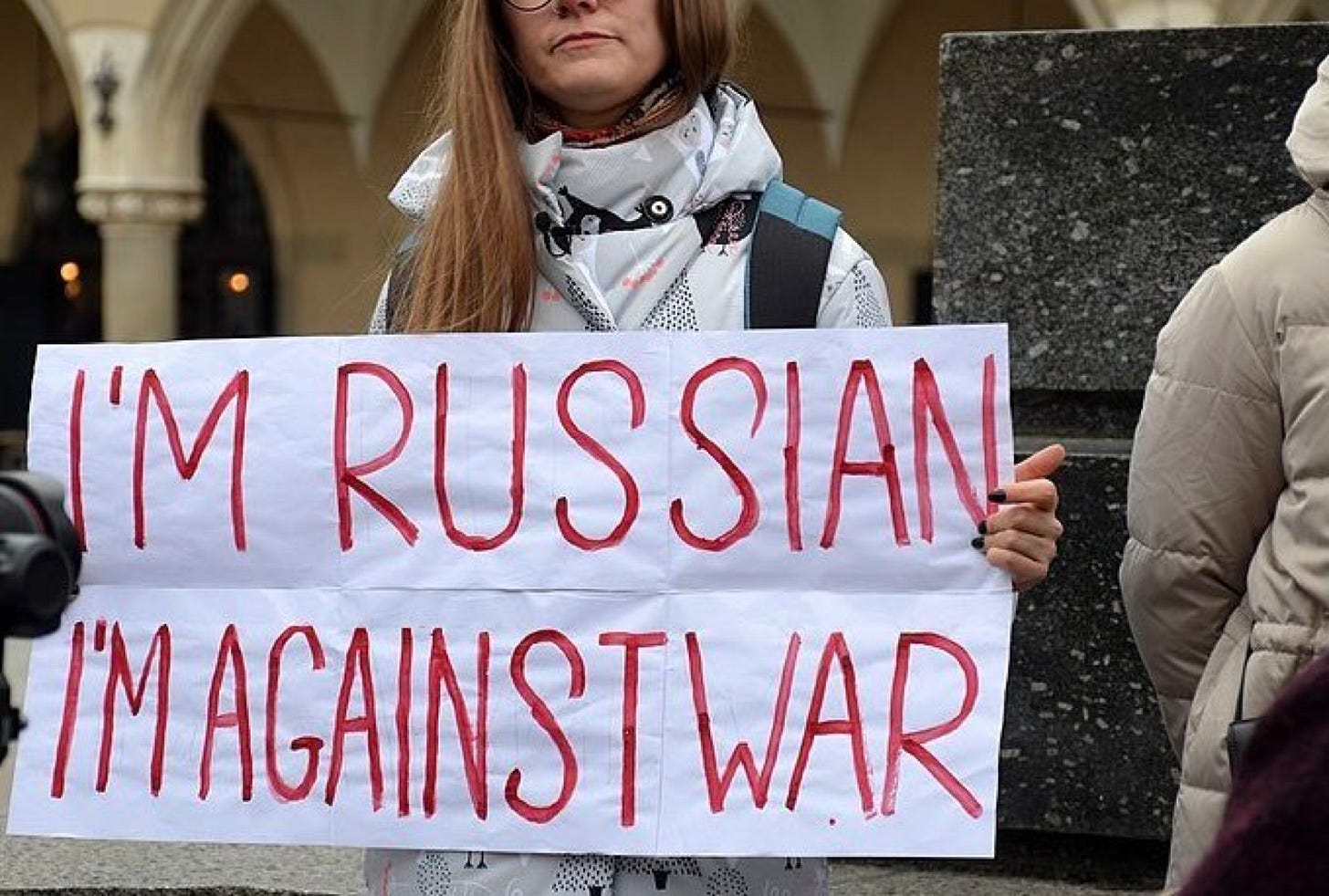Russian State v Religion
The story of the Russian regime’s state capture of religion in Russia. Part four of four.
Part Four
Russian political interference in the US and other countries, targeting religious organisations:
In her latest book, ‘Holy Russia versus the West’ (‘La Sainte Russie contre l’Occident’), CERI research director Kathy Rousselet examines the relationship between the Russian Orthodox Church, the Kremlin, and Russian society. In the process, she invites readers to go beyond the image of Patriarch Kirill supporting the war against Ukraine and promising absolution of the sins of any fallen soldier on the front line of this quasi-crusade. While Kirill champions Putin’s ultra-conservative positions, accusing the West of all evils, the relationship between Church, power and society in Russia is not unambiguous.
According to the 1993 Constitution, the Russian state is officially a secular state. Amendments made in 2020 did not fundamentally change this, even though they refer to the memory of ancestors who passed down ideals and faith in God. This does not mean that all religions are equal. Russia is a multiethnic and multi-religious state(1), but the preamble to the law on freedom of conscience and religious organisations adopted in 1997 recognises, ‘the special role of Orthodoxy in the history of Russia, and in the evolution and development of its spirituality and culture’. The Russian Orthodox Church has become the main religious establishment with which various administrations maintain relations. It receives the most subsidies. And the authorities distinguish between ‘traditional’ and ‘non-traditional’ religions.
After 1991, and particularly with Vladimir Putin, the #Russian #Orthodox #Church was used to foster spiritual and moral values. The Russian president sees religion in continuity with communism. In exchange for special treatment, the Church has been given the means to rebound; it has won a number of cases, such as the restitution of ecclesiastical property that belonged to the State or municipalities, and the teaching of religion in schools. The political, economic and religious elites are closely linked.
Russia is using a multi platform, multi party and multi religious organisational approach to destabilising democracies across the western world. In a report by Reuters on October 20, 2023 they frame the approach by Russia. “The United States on Friday released a U.S. intelligence assessment sent to more than 100 countries that found Moscow is using spies, social media and Russian state-run media to erode public faith in the integrity of democratic elections worldwide. This is a global phenomenon," said the assessment. Our information indicates that senior Russian government officials, including the Kremlin, see value in this type of influence operation and perceive it to be effective."
AP on the same day went on to warn that “The U.S. is warning nearly 100 countries that Russian intelligence is opening a new front in its efforts to destabilize democracies by amplifying doubts about the legitimacy of vote-counting and elections, senior government officials said Friday. Russia has long advocated overtly and covertly for candidates it backs to win elections in other countries, but intelligence officials say they have recently identified a new tactic — sowing doubts about the reliability of democracy itself.
Despite the Church’s apparent presence in the political arena, in a December 2021 poll asking Russians about the most authoritative people in the country, Kirill did not make the cut. Very few Orthodox #Christians are churchgoers. The Church’s influence on society remains weak. Finally, in a Russia subject to increasingly authoritarian rule, the Church has little autonomy.
Next 👉 Multipolar world promoted
Since the early 2000s, Kirill and Vladimir Putin have been promoting the same idea of a multipolar world in which Russia has its own specific path. Kirill opposes globalisation of the liberal world and emphasises the importance of traditions.
Vladimir Putin’s and Kirill’s maps of the world are alike. The ‘Russian world’ that the Russian president sees as his zone of influence is of a piece with the canonical territory of the Russian Church, according to Kirill. This applies in particular to ‘Holy Russia’, which according to the Patriarch includes Russia, Ukraine, Belarus and Moldova. Between 2000 and 2010, both developed a policy of influence in the world extending far beyond the former Soviet space.
In his first speech, on February 24, 2022, the #Patriarch called for peace, but he quickly changed his tune and radicalised. At first, he presented the war as a metaphysical conflict between Good and Evil – a means of fighting against globalisation and secularised liberal culture, epitomised by gay pride. In this civilisational conflict, he called for the preservation of traditional values to prevent an apocalyptic end of the world.
Just like the authorities, Kirill presents Russia as a besieged citadel, and the war in Ukraine as a defensive war. The theme of sacrificial feats also permeates Kirill’s comments, which hark back to Soviet patriotic rhetoric drawing on the memory of World War II. On September 25, 2022, he asserted that Russian soldiers who died in the war in Ukraine would be absolved of all their sins. We were a little quick to conclude that he was calling for a holy war.
Kirill’s comments need to be analysed in an ecclesial context marked by the powerful influence of ultranationalism. I’m thinking in particular of Tikhon Shevkunov, the Metropolitan of Pskov and Porkhov, who praised Putin in 2021 and regretted only one thing: that the Russian president is not immortal. Just after the start of the war, on Forgiveness Sunday, he explained the necessity of the war by echoing Putin’s rhetoric and speaking of the need to de-Nazify Ukraine. Tikhon Shevkunov, who is close to Vladimir Putin, could be a rival to Kirill in heading the Moscow Patriarchate.
The Patriarch’s speeches must also be understood in the context of the religious situation in Ukraine. While he calls for fighting Evil from the West, Kirill constantly brings up the ‘brotherhood of Rus peoples’. This discourse obviously endorses the ‘Russian world’ – Russia’s sphere of influence – but it also reflects an attempt to keep the Ukrainian Orthodox Church, which has increasingly detached from the Moscow Patriarchate during the war, in its fold. On May 27, 2022, this church proclaimed its ‘independence’. In the autumn of 2022, it chose to produce its own Holy Chrism(3) as a way of claiming this independence. Given that the Ukrainian authorities consider it to be an agent of Moscow, the church is in survival mode. It has lost rights to use the Kiev Lavra Caves – a major Orthodox site founded in 1051 and home to more than 200 of its monks.
2/4 Russia - the “Champions of Christian values..🤣”
For years, Vladimir Putin has sought to present Russia as the champion of Christian and traditional values. He portrays the West as a dystopia of decadence, where elites push “strange and trendy ideas like dozens of genders or gay pride parades.” In his speech announcing Russia’s invasion of Ukraine last year, Putin accused the West of seeking “to destroy our traditional values and force on us their false values that would erode us, our people from within.”
Shortly after the latest invasion of Ukraine, Arizona state Sen. Wendy Rogers (R) was only one of the speakers at the Feb. 25 America First Political Action Conference to voice support for Russia’s invasion of Ukraine. But her meme-ready remark — urging more tanks and using a crude term to call for fewer transgender people — reminds us that many on the American right see Russia as an ally in the culture wars. This long-standing alliance has forced a rift within the Republican Party since Russian President Vladimir Putin’s invasion of Ukraine. Even with mounting civilian casualties this week and a growing humanitarian crisis, former president Donald Trump’s most ardent supporters refuse to condemn his remarks about the “smart” invasion.
But there is another dimension to this rift, illustrated by the audience to which Rogers spoke: how this alliance of cultural conservatives in the United States and Russia has also embraced racial and ethnic bigotry. White evangelicals once saw Russia as an existential threat to traditional gender roles and sexual morality, but over the past three decades, they have forged a partnership in a global family values movement that not only embraces sexual and gender traditionalism but sees these practices as a solution to demographic changes around the globe.
In fact, GOP-proposed state-level anti-transgender and “Don’t Say Gay” bills actually echo Russian laws — which isn’t surprising since U.S. conservatives contributed to the Russian legal prohibitions. That’s become a real problem for Republican leaders, who over the past week have rejected not only AFPAC’s support for Putin’s war but also the group’s explicit white nationalism, antisemitism and incitements to violence.
But Russia under the Bolsheviks challenged the very nuclear family that American Christians saw as the bedrock of civilization and property relations. The 1918 Family Code predicted that by turning domestic labor into a public service rather than a private duty, socialism would eliminate “the fetters of husband and wife.”
Over the next decade, Soviet authorities did their best to fulfill that prediction. They shuttered churches, secularized schools and removed Bibles from libraries while decriminalizing abortion, liberalizing divorce and recognizing de facto marriage. In 1929, new laws barred foreign proselytizers. Atheists organized in the League of the Militant Godless pledged to eradicate religion in the #SovietUnion by 1937.
Nothing could have alarmed believers in the United States more. With atheistic Russian #Communism as the enemy, Christianity and sexual and gender conservatism became crucial fronts in the Cold War.
Next 👉 Tucker Carlson wades in to find an audience
Tucker Carlson has also recently been publicly lamenting modern global events that "seem like an attack on Christianity," including the decimation of the Christian population in Iraq and U.S. policies that have led to the killing of Christians in Syria, followed by Russia's invasion of Ukraine, the impetus for the government's banning of “an entire Christian denomination” and the jailing of clergy, even as the U.S. allocates over $113.4 billion in economic, humanitarian and military aid to that country funded by American taxpayers.
Tucker Carlson just gave his speech in Hungary where he warned that Washington hates Russia because it’s a Christian country. In July, during the Family Leadership conference in Iowa, Tucker Carlson also clashed with former Vice President Mike Pence over the issue of U.S. aid for Ukraine. While Pence and many other Republican presidential hopefuls support a tough stance toward Moscow, some American conservatives sympathize with Vladimir Putin because he purports to defend “traditional, moral and spiritual values.”
Websites proliferating misinformation around Ukraine’s crackdown on Russian backed and linked Orthodox churches are spreading across the internet, influencing the US Christian audience. Claims from quasi religious-political outfits (i.e Christian post .com) make absurd claims such as “The Ukrainian government “decided that that Ukraine Orthodox Church should replace the spiritual home of Ukrainians,” and “that church, called the OCU, has been engaged in an absolutely vicious, unlimited campaign to steal property, harass, intimidate and jail clerics, force conscription on believers, act in a manner that is almost unbelievable in a civilized society”, is the Russian regimes narrative aimed as sowing discord and pushback against their centres of influence being eroded in the Ukrainian communities.
On the contrary, Protestants are sounding the alarm: several religious organizations have been declared undesirable on the territory of Russia. The authorities claim that the ban applies to specific communities near institutions. On August 23, 2023, on the website of the General Prosecutor's Office of the Russian Federation, a message appeared on non-governmental organizations as undesirable in the country: the International Christian Movement and the Evangelical Christian Church “New Generation” from Latvia, as well as the Spiritual Administration of Evangelical Christians of the Ukrainian Christian Church “New Generation” and the International Bible College "New generation" from Ukraine.
The reason for making this decision was that their activities pose a threat to the foundations of the constitutional order and security of the Russian Federation,” the statement said, but did not specify what this threat was. “Recognition of the activities of a foreign or international non-governmental organization as undesirable on the territory of the Russian Federation entails, among other things, a ban on the creation on the territory of the Russian Federation, as well as the termination of the activities of its previously created structural divisions.
Tucker Carlson will not recognise or admit to the measures being taken by the Russian regime closing down hundreds of Christian churches in Russia, but continues to push the narrative that the Russian Orthodox Church is not linked or influenced by an indicted war criminal and his regime. Russia’s malign influence on the Christian community, has reached and support from organisations across the west and especially in the US.
Religion is particular objective of Russian #Maskirovka, sowing doubt and division across the evangelical communities in the US and across the world softens and mutes the anti-Russian sentiment in western countries, and in the US it is a force to be reckoned with as US politicians look to push controversial and extremist messaging as a means to bolster their support and influence the democratic landscape.
This publication is thread one of four, see the previous three threads for a broader view on religion in Russia, and its affiliation and capture by the Russian regime.
References and sources:
https://townhall.com/columnists/ivana-stradner/2023/08/31/russia-is-not-the-champion-of-christian-and-traditional-values-n2627762
https://www.ng.ru/ng_religii/2021-08-31/9_514_protestants.html
https://www.washingtonpost.com/outlook/2022/03/05/bond-that-explains-why-some-christian-right-support-putins-war/
https://www.csis.org/analysis/russian-malign-influence-montenegro-weaponization-and-exploitation-history-religion-and
https://en.m.wikipedia.org/wiki/Persecution_of_Christians_in_the_Soviet_Union
https://www.jstor.org/stable/pdf/24358086.pdf?refreqid=fastly-default%3Afb74000006ba53ba8711ea3c099502e8&ab_segments=&origin=&initiator=&acceptTC=1
https://www.uscirf.gov/sites/default/files/2023-07/2023%20Russia%20Country%20Update_07.05.pdf
https://www.reuters.com/world/us/us-intelligence-report-alleging-russia-election-interference-shared-with-100-2023-10-20/
https://apnews.com/article/election-interference-misinformation-voter-fraud-russia-cabdacd3d4a1dd8296a1419b03ed751d









Another illuminating and thought provoking read. You drew parallels between the traditional 'Christian values' that putin and the ROC espouse with some in the GOP, a connection that I hadn't thought of! Thanks Beefy